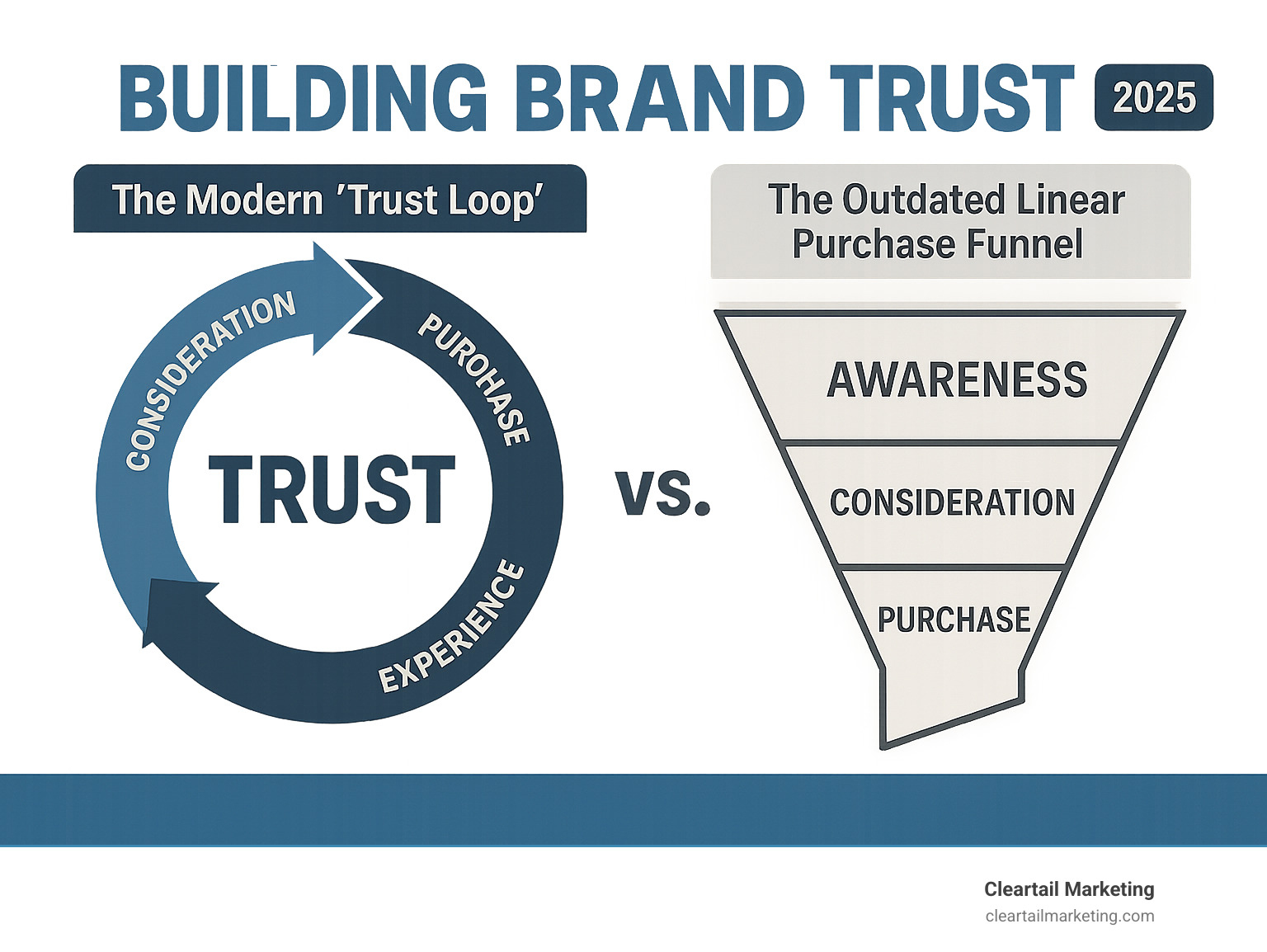Why Brand Trust Matters More Than Ever
Building brand trust is key for any business. It means customers believe in your brand and trust you to deliver on your promises. This trust comes from:
- Reliability: Your products or services work as expected.
- Integrity: You act honestly and ethically.
- Competence: You have the skills to meet their needs.
- Transparency: You are open about your operations and values.
- Consistency: Every interaction matches your brand’s message.
In a world of change and uncertainty, consumers seek reliable brands. Feeling vulnerable, they demand more, wanting to understand a brand’s true intentions. The old marketing purchase funnel is obsolete; a purchase is now just the start of a relationship.
Gen Z, for example, highly values trust and influences how everyone buys, including older generations. An Edelman report found 79% of Gen Z say trusting a brand is more important now than ever, as they seek deep, ongoing connections.
This means brand trust is vital for business success. Trusted brands see more sales, better customer retention, and new customers through word-of-mouth. Highly trusted brands are seven times more likely to be purchased, and 67% of people require trust for repeat business. Building trust is a necessity, not a luxury.
As Magee Clegg, CEO of Cleartail Marketing, my experience since 2014 includes helping B2B companies grow by building brand trust. We’ve seen how a trustworthy brand increases revenue, website traffic, and customer advocacy.

The Foundations of Brand Trust: Why It’s Non-Negotiable
Building brand trust is no longer optional; it’s the foundation of modern business. Consumers now seek relationships, not just transactions.
The old linear “purchase funnel” is obsolete. It’s been replaced by what experts call “The Collapse of the Purchase Funnel”—a dynamic loop where trust fosters ongoing relationships. This shift means customers evaluate your brand constantly. When they trust you, the results are powerful.

When customers trust your brand, they become your biggest fans. They will defend you, recommend you, and stay loyal despite competitor pricing. This organic advocacy is invaluable.
At Cleartail Marketing, we see that companies with strong brand trust thrive. Their customers are more loyal and valuable. That’s why online reputation management is so important, as reputation directly impacts trust, and trust drives everything else.
To dive deeper into this shift, download the full report on The Collapse of the Purchase Funnel. It’s packed with insights to help you adapt your strategy to this new reality.
The Modern Consumer: Demanding More Than Just a Product
Recent economic, health, and social challenges have made consumers more cautious. They’re not just buying products; they’re supporting companies they believe in.
This means consumers are doing their homework. They’re price-conscious, research everything before buying, and make fewer impulse purchases. They also care about your company’s location and values.
Gen Z leads this charge, with 68% of all consumers saying this generation influences their shopping habits. This influence is growing, even among those over 59. Gen Z is changing how everyone buys.
These younger consumers demand transparency, authenticity, and real engagement. Crucially, they expect brands to take stands on important issues. The numbers back this up: 86% of people believe CEOs should publicly address societal issues, and 83% of millennials prioritize buying from brands that reflect their values.
The bottom line: neutrality is no longer an option. Customers demand that your actions align with your words.
Cognitive vs. Affective Trust: Winning Hearts and Minds
Building brand trust involves two distinct types: cognitive and affective. It’s about winning both hearts and minds.
Cognitive trust is rational and evidence-based. Customers trust that you can deliver because you’ve proven your competence, reliability, and quality. For example, a software company providing bug-free updates builds cognitive trust.
Affective trust is emotional, based on shared values and care. Customers trust that you will act in their best interest due to your integrity. A fair-trade coffee brand building a community is an example of affective trust.
The Trust Project at Northwestern identifies three pillars for this: competence (skills), benevolence (caring), and integrity (actions matching words).
You need both types of trust to succeed. Volkswagen’s emissions scandal was a failure of integrity, which is harder to recover from. In contrast, Samsung recovered from its Galaxy Note 7 battery issue because it was a competence problem that they fixed, which is more forgivable to customers.
| Cognitive Trust (Head) | Affective Trust (Heart) |
|---|---|
| Based on: Evidence, performance, reliability | Based on: Values, emotions, relationships |
| Focuses on: Can they deliver? | Focuses on: Will they do right by me? |
| Examples: Quality products, great service, consistent delivery | Examples: Ethical practices, social responsibility, transparent communication |
The key is to build both types of trust simultaneously. Show you have the skills to deliver and the integrity to do what’s right. This creates relationships that transcend simple transactions.
Core Pillars for Building Brand Trust
Now that we understand why trust matters, let’s dive into the practical steps you can take. Think of these three pillars as the foundation of your trustworthy brand. Get these right, and everything else becomes easier.
Pillar 1: Practice Radical Transparency and Uphold Ethical Conduct
Consumers easily spot fake promises. Radical transparency is essential for building brand trust because they’ve been burned by brands that don’t deliver.
A major customer concern is data privacy. Amidst phishing and scams, people are wary of sharing personal information. However, 66% of people will trust a company more if it’s transparent about its data usage. This means having clear privacy policies, being upfront about data collection, and giving customers control. It’s about respect, not just compliance.

Transparent pricing is a key trust-builder. Price is the most impactful factor in brand trust. Avoid hidden fees and be clear about costs upfront to show value. While some price-sensitive customers may leave, those who stay will be more trusting.
Transparency extends to ethical business practices that align with your values. Consumers, especially millennials, vote with their wallets; 83% of millennials say it’s important to buy from brands reflecting their views. If you claim to be eco-friendly, use sustainable packaging. If you value employees, ensure a positive workplace culture. Any gap between words and actions will be noticed and publicly criticized.
We’ve seen this in our Online Reputation Management Case Studies. Brands that recover fastest admit mistakes and make real changes. If you’re struggling to align your image with your practices, our Business Reputation Management Agency can help.
Pillar 2: Deliver a Flawless and Consistent Customer Experience
A simple truth: consistency builds trust. Every customer interaction either strengthens or weakens their confidence. Consider your favorite coffee shop. You love it because it’s consistently good—from the coffee to the service. That’s the power of consistency in building brand trust.
The consistency challenge is significant, as 98% of online users switch between devices daily. A customer journey from phone to laptop to tablet must be seamless, or trust erodes.
Omnichannel consistency is crucial. Your brand’s message and feel must be seamless across your website, social media, and customer service. Our Website Design services at Cleartail Marketing focus on creating these responsive, intuitive experiences.
Customer service excellence turns frustrated customers into loyal advocates. Great service builds emotional connections, not just solves problems. Train your team to listen with empathy and empower them to solve problems. Customers who feel heard and valued are more forgiving.
Inconsistent product quality undermines all other efforts. Your product is the foundation; it must consistently deliver on its promises by meeting or exceeding expectations.
Post-purchase engagement is also key. The sale is the start of the relationship. Follow up with helpful tips and check-ins to show you care about their success, not just their money.
Key touchpoints for consistency include: your website experience, social media personality, email marketing value, customer service empathy, product delivery reliability, any in-store experience alignment with your online presence, and advertising honesty.
Pillar 3: Master Your Digital Presence and Cultivate Social Proof
Your online presence is your reputation in action. Social proof is one of the most powerful trust-building tools. Social media has changed how people build brand trust. Now, 78% of consumers (88% of Gen Z) say a brand’s social media presence has a greater impact on their trust than a year ago—a massive shift.
Responding to customers on social media is essential. The 2023 Sprout Social Index™ found 51% of consumers find brand responses on social media memorable. Quick, helpful replies show everyone watching that you care. This is a core part of our Social Media Management services.
User-generated content (UGC) is powerful because it’s trusted more than ads. Real customer photos and reviews carry significant weight. Encourage and celebrate UGC to build trust.
Online reviews and testimonials are vital. 77% of shoppers seek them out before buying. How you handle negative reviews is also crucial; responding professionally to solve problems publicly builds trust by showing you stand behind your products.
Influencer marketing, when done right, is highly effective. 47% of marketers use it to build authenticity and trust. The key is choosing influencers who genuinely align with your values and have a trusted audience. 83% of people trust recommendations from people they know. The right influencers act as trusted friends to their audiences. Authentic partnerships, like CeraVe and Michael Cera, work because they feel genuine.
Mastering your digital presence and leveraging social proof helps you build brand trust organically. Your customers become powerful advocates, which is more valuable than any ad budget.
Advanced Strategies for Strengthening and Measuring Trust
Once the foundation is set, these advanced strategies help deepen connections, quantify your efforts, and prepare you for potential crises.
Leveraging Authentic Storytelling for Building Brand Trust
Stories are fundamental to human connection. For building brand trust, authentic storytelling reveals your brand’s heart, creating emotional connections beyond simple features and benefits.
Your brand origin story is a powerful tool. Sharing your journey, mission, and the people involved humanizes your brand. For example, Dieux Skin built trust through radical transparency about their processes, creating a beloved “too much information” brand.
Showcasing employees and leadership is a game-changer. People trust people, not corporations. Seeing the humans behind the brand creates a connection. In fact, 48% of consumers want to see more employees in brand social content. Mayo Clinic excels at this, featuring staff to make their brand feel approachable.
Thought leadership content builds cognitive trust by establishing you as an authority. Publishing insightful blogs, whitepapers, or webinars positions you as a trusted advisor, not just a vendor. Strong SEO Content Writing ensures this expertise reaches the right audience.
Crucially, choose authenticity over perfection. Consumers appreciate brands that are real. Admitting mistakes and showing the genuine side of your business builds stronger, more resilient relationships.

How to Measure and Track Brand Trust Over Time
To improve brand trust, you must measure it. This requires tracking multiple data points, and there are several reliable methods to do so.
Net Promoter Score (NPS) is a key metric for loyalty and trust. Trusting customers are more likely to recommend you, so a high NPS score signals high trust.
Customer Satisfaction (CSAT) and Customer Lifetime Value (CLV) also offer insights. High CSAT scores reflect positive experiences, while a high CLV indicates long-term trust and value.
Social listening tools are essential for understanding public perception. They monitor online conversations, and 61% of brands use them to improve trust. This helps you spot and address issues early.
Sentiment analysis analyzes the emotional tone of brand mentions, helping you understand how people feel. Positive sentiment signals trust, while negative sentiment highlights problems.
Monitoring online reviews and ratings on platforms like Google and Yelp is crucial. Review trends are direct indicators of trust. Regular monitoring allows for quick responses.
Your website traffic and engagement metrics also reflect trust. Higher direct traffic, longer sessions, and better engagement rates suggest users see your site as a trustworthy resource. Our Website Marketing Analytics services help track these metrics.
Finally, brand trust surveys provide direct feedback. Ask specific questions about competence, integrity, and shared values to gain quantitative and qualitative insights.
Recovering from a Trust Deficit: A Framework for Building Brand Trust
Even trusted brands can face a reputation-damaging crisis. The consequences are severe, with only 10% of shoppers staying with a brand that lost their trust. However, recovery is possible with a committed, strategic approach.
First, acknowledge mistakes and apologize sincerely. Own the problem completely and without excuses. A swift, genuine apology is the foundation for recovery.
Accountability and corrective actions turn apologies into meaningful change. Consumers need to know what went wrong and what you’re doing to prevent it from reoccurring. This demonstrates both integrity and competence.
Communicating changes transparently is crucial. Be open and consistent. For example, after its Galaxy Note 7 battery issue, Samsung communicated its new safety checks extensively. Their recovery was swift because it was a competence problem they demonstrably fixed.
The type of trust violation matters. The Samsung vs. Volkswagen case illustrates this. Samsung recovered from a technical (competence) failure. Volkswagen’s emissions scandal was an integrity failure—intentional deception. Despite corrective actions, VW’s plan to exit the diesel market shows that integrity violations are much harder to overcome.
The boycott of Bud Light shows how quickly trust erodes when actions misalign with audience values. This highlights the importance of understanding your customers and aligning actions with their expectations.
At Cleartail Marketing, our experience with Online Reputation Management Case Studies demonstrates how strategic, sincere efforts can repair and even strengthen a brand’s reputation. The key is a genuine commitment to change, not just damage control.
Frequently Asked Questions about Building Brand Trust
When it comes to building brand trust, we hear the same questions from business owners time and time again. Let’s explore the most common concerns.
What is the difference between brand trust and brand loyalty?
Think of brand trust as the foundation and loyalty as the house built on it. Brand trust is the customer’s confidence that you’ll deliver on promises and act with integrity. It’s the belief that you’re reliable and have their best interests at heart.
Brand loyalty is the result of that trust: customers repeatedly choose your brand, recommend you, and stick with you. They become advocates. You can’t have genuine loyalty without trust. Trust is the emotional foundation; loyalty is the behavioral result. Loyalty without trust is fragile.
How does Gen Z’s view on brand trust differ from other generations?
Gen Z has changed brand expectations. With 79% of Gen Z stating that trusting a brand is more important than ever, they’ve set a new standard that influences all shoppers. They demand radical transparency, wanting to see behind the curtain of polished marketing. They want to know how products are made, where materials are sourced, and what your company truly stands for.
They expect authentic social media engagement and for brands to take clear stances on social and ethical issues. They buy into values, not just products. This has a ripple effect: consumers aged 59+ report a 12-point increase in Gen Z’s influence on their shopping. This generation is rewriting the rules of building brand trust.
What is the single most important factor for building brand trust?
If we had to pick one factor, it would be consistency. It’s a simple concept where many brands stumble.
Consistency means unwavering product quality and a seamless customer experience across all touchpoints. Your brand messaging must also be consistent. The values you promote must match your operations. A disconnect, like claiming to be eco-friendly while using wasteful packaging, will be noticed.
Crucially, your stated values must align with your practices. Savvy customers research brands and share experiences, quickly exposing any gap between words and actions. Focusing on consistency builds both cognitive trust (you can deliver) and affective trust (you will do right by them). A consistent, reliable experience is the foundation of lasting brand relationships.
Conclusion
Building brand trust isn’t a one-time task. It’s like tending a garden, requiring daily care and commitment. Trust grows slowly through small interactions but can vanish instantly.
Trust is the thread connecting everything. When you establish and live by clear values, deliver consistent experiences, engage authentically, and measure your progress, you build reliance and deepen relationships.
The brands that thrive today are not the loudest or cheapest, but the most trusted. They are the brands people choose, recommend, and forgive when mistakes happen.
Here at Cleartail Marketing, we’ve seen how building brand trust transforms businesses. Since 2014, we’ve helped companies strengthen their reputations and customer connections. We know managing your brand’s image is overwhelming while running a business.
Having the right partner makes all the difference. We don’t just manage your online reputation; we help you build a trustworthy brand that customers want to support.
Ready to build an unshakeable reputation? Explore our Online Reputation Management Services to learn how we can help you create the trust that drives real business results.



